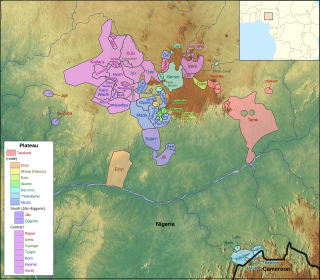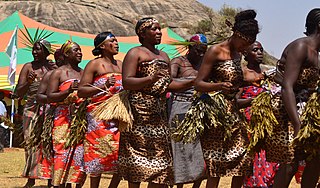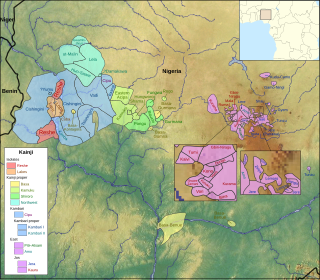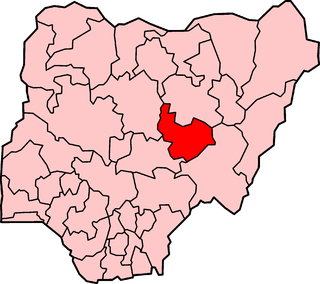
Benue–Congo is a major subdivision of the Niger–Congo language family which covers most of Sub-Saharan Africa. It consists of two main branches:

The forty or so Plateau languages are a tentative group of Benue–Congo languages spoken by 3.5 million people on the Jos Plateau and in adjacent areas in central Nigeria. The original formulation included the Jukunoid and Kainji languages, and later the Dakoid languages; Jukunoid and Kainji now form a parent branch of Plateau called Central Nigerian (Platoid).
The Kurama or T'kurmi or Akurmi language is a Kainji language of Nigeria. Kurama speakers are found in the central northern Nigerian states of Kaduna, Bauchi, Borno, Kano, Jigawa and Plateau.
Eggon, erroneously referred to as Mada - formerly a Plateau language spoken in central Nigeria. It is a major language in Nasarawa State.
Pan is an Afro-Asiatic dialect cluster spoken in Plateau State, Nigeria.

Ron is an Afro-Asiatic language cluster spoken in Plateau State, Nigeria. Dialects include Bokkos, Daffo-Mbar-Butura, Monguna. Blench (2006) considers these to be separate languages.

The Kainji languages are a group of about 60 related languages spoken in west-central Nigeria. They form part of the Central Nigerian (Platoid) branch of Benue–Congo.
Cipu (Cicipu), or Western Acipa, is a Kainji language spoken by about 20,000 people in northwest Nigeria. The people call themselves Acipu, and are called Acipawa in Hausa.
The East Kainji languages are spoken in a compact area of the Jos Plateau in Nigeria, near Jos. There are more than 20 of them, most of which are poorly studied.
Ahwai, also called the Ndunic languages, is a Plateau language cluster spoken to the southwest of Fadan Karshi in Sanga LGA, Kaduna State, Nigeria. Most villages are located at the foot of the Ahwai Mountains in Kaduna State.
Berom or Birom is the most widely spoken Plateau language in Nigeria. The language is locally numerically important and is consistently spoken by Berom of all ages in rural areas. However, the Berom are shifting to Hausa in cities. The small Cen and Nincut dialects may be separate languages. Approximately 1 million (2010) people speak in this language.
Koro Wachi, natively Tinɔr and Myamya, is a dialect cluster of Plateau languages spoken to the north of Keffi in Nasarawa State and Kagarko Local Government Area of southern Kaduna State in central Nigeria. Koro language is a Hausa cover term for several local languages, such as the Jilic languages. Koro Wachi forms part of a larger cultural grouping with the Ashe.
Laru is a minor Kainji language of Nigeria. It has one dialect: Cuba (Shuba). Speakers are shifting to Busa.
Bauchi is a cluster of Kainji languages spoken in Rafi, Nigeria LGA, Niger State, Nigeria.
Kimba is a Kainji language cluster of Nigeria spoken by the Kambari people. As of 2004, there were 100,000 native speakers.
Lopa consists of a pair of minor Kainji languages of Nigeria. Ethnic Lopa neighbouring the Busa language have shifted to that language.
Lere is a nearly extinct Kainji dialect cluster of Nigeria. The ethnic population was cited as 16,000 in 2000, of whom only a few speak the language. A wordlist from the Takaya dialect can be found under External links.
Ziriya (Jiriya) and Sheni (Shaini) constitute a Kainji language of Nigeria. They are geographically but perhaps not linguistically distinct.

Bicizà which is today called Mc Alley or in some instances, Mista Ali is a small town in Buji district of Plateau state that has boundaries with Jos North Local Government Area. It is the gateway to the State when coming from Zaria, Kaduna State and Kano State as well, in central Nigeria. It is the village to the Boze or Buji people, a dialect cluster of Kainji languages in Nigeria. Neighboring towns and villages close to Bicizà include Icizà, Zùku, Owoyoyo, Tipo, Bìdiri, Urakun, Bihol, Màlèempe, Gɔ̀rɔɔŋ, Rɛ̀woo, all in Buji district The language of the people also forms part of the ‘Jere cluster’ and is in turn, part of the Northern Jos group of the East Kainji languages Jos. spoken north of Jos town in Central Nigeria.

Bicizà which is today called Mc Alley or in some instances, Mista Ali is a small town in Buji district of Plateau state that has boundaries with Jos North Local Government Area. It is the gateway to the State when coming from Zaria, Kaduna State and Kano State as well, in central Nigeria. It is the village to the Boze or Buji people, a dialect cluster of Kainji languages in Nigeria. Neighboring towns and villages close to Bicizà include Icizà, Zùku, Owoyoyo, Tipo, Bìdiri, Urakun, Bihol, Màlèempe, Gɔ̀rɔɔŋ, Rɛ̀woo, all in Buji district The language of the peope also forms part of the ‘Jere cluster’ and is in turn, part of the Northern Jos group of the East Kainji languages spoken north of Jos town in Central Nigeria.





